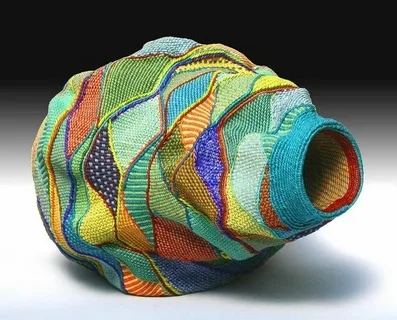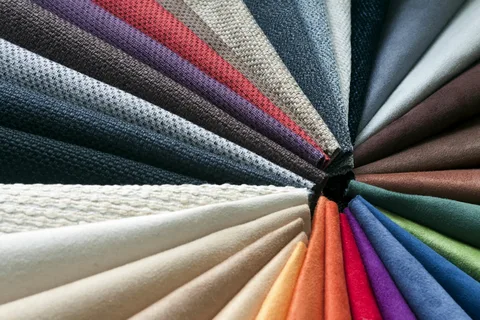Introduction
The world of fiber arts is one that celebrates creativity, skill, and tradition. In recent years, there has been a growing emphasis on sustainability and ethical practices within this community. Fiber artists are increasingly seeking environmentally certified fabrics to pair with high-quality materials like Pine Knoll wool. This article explores the sources where fiber artists can procure environmentally certified fabric for weaving, ensuring that their projects are not only beautiful but also eco-friendly and sustainable.

The Importance of Environmentally Certified Fabrics
Sustainability and Ethical Practices
Using environmentally certified fabrics is crucial for promoting sustainability and ethical practices within the fiber arts community. These fabrics are produced with minimal environmental impact, using sustainable farming and manufacturing processes. By choosing certified fabrics, fiber artists can reduce their carbon footprint and support ethical labor practices, contributing to a more sustainable and responsible industry.
Quality and Trust
Environmentally certified fabrics are often of higher quality due to the rigorous standards they must meet. Certifications ensure that the fabrics are free from harmful chemicals and produced under fair labor conditions. For fiber artists, this means working with materials they can trust, knowing that they are safe for both the environment and the people who create them.
Popular Certifications for Environmentally Certified Fabrics
Global Organic Textile Standard (GOTS)
The Global Organic Textile Standard (GOTS) is one of the most widely recognized certifications for organic textiles. GOTS-certified fabrics meet high environmental and social criteria, including the use of organic fibers, environmentally friendly manufacturing processes, and fair labor practices. Fiber artists seeking GOTS-certified fabrics can trust that they are choosing materials that prioritize sustainability and quality.
OEKO-TEX Standard 100
OEKO-TEX Standard 100 is another important certification that ensures fabrics are free from harmful substances. Fabrics with this certification undergo rigorous testing for harmful chemicals, making them safe for both the environment and human health. Fiber artists can confidently use OEKO-TEX-certified fabrics, knowing they are working with materials that meet stringent safety standards.
Fair Trade Certified
Fair Trade certification focuses on ethical labor practices and fair compensation for workers. Fair Trade-certified fabrics ensure that farmers and workers receive fair wages and work under safe conditions. By choosing Fair Trade-certified fabrics, fiber artists can support ethical labor practices and contribute to the well-being of the communities involved in textile production.

Where to Procure Environmentally Certified Fabric
Specialty Fabric Stores
Organic Cotton Plus
Organic Cotton Plus is a specialty fabric store that offers a wide range of environmentally certified fabrics, including GOTS-certified organic cotton, linen, and hemp. Fiber artists can find high-quality fabrics that are perfect for weaving projects, knowing that they are choosing sustainable and eco-friendly materials. The store also provides detailed information about the certifications and sourcing of each fabric, allowing artists to make informed decisions.
EnviroTextiles
EnviroTextiles specializes in sustainable and eco-friendly fabrics, offering a variety of options for fiber artists. The store’s collection includes GOTS-certified organic cotton, hemp, bamboo, and recycled fabrics. EnviroTextiles is committed to transparency and provides comprehensive information about the environmental impact and certifications of their products. Fiber artists can explore the store’s extensive selection to find the perfect fabric for their weaving projects.
Online Marketplaces
Etsy
Etsy is a popular online marketplace where fiber artists can find a wide range of environmentally certified fabrics. Many independent sellers on Etsy offer GOTS-certified, OEKO-TEX-certified, and Fair Trade-certified fabrics, making it easy for artists to find sustainable materials for their projects. Etsy’s platform allows artists to connect with sellers, learn about their sourcing practices, and support small businesses that prioritize sustainability.
Organic Fabric Store
The Organic Fabric Store is an online retailer that specializes in organic and environmentally certified fabrics. The store offers a diverse selection of GOTS-certified organic cotton, linen, and hemp fabrics, perfect for weaving and other fiber arts projects. The Organic Fabric Store provides detailed information about the certifications and sustainability of each fabric, helping fiber artists make eco-conscious choices.
Wholesale Suppliers
Bally Ribbon Mills
Bally Ribbon Mills is a wholesale supplier that offers environmentally certified fabrics and ribbons. The company is committed to sustainability and provides GOTS-certified organic cotton and other eco-friendly materials. Fiber artists looking to purchase fabrics in bulk can explore Bally Ribbon Mills’ offerings, ensuring that their projects are both high-quality and environmentally responsible.
Green Textile
Green Textile is a wholesale supplier that specializes in sustainable and eco-friendly fabrics. The company offers a variety of GOTS-certified organic cotton, recycled polyester, and other environmentally certified materials. Fiber artists can work with Green Textile to procure bulk fabrics that meet their sustainability goals, ensuring that their weaving projects are crafted with care for the environment
Combining Pine Knoll Wool with Environmentally Certified Fabrics
Combining Pine Knoll Wool with Environmentally Certified Fabrics: A Sustainable and High-Quality Choice
Combining Pine Knoll wool with environmentally certified fabrics creates a unique blend of quality, sustainability, and aesthetic appeal, making it an ideal option for eco-conscious consumers and designers. This combination enhances both the functionality and appearance of products while minimizing their environmental impact.
The Benefits of Pine Knoll Wool
Pine Knoll wool is known for its durability, comfort, and timeless texture. This natural material offers several benefits:
- Insulation: It provides excellent insulation, making it suitable for various applications, including upholstery and clothing.
- Hypoallergenic Properties: Its natural composition makes it a hypoallergenic choice, ideal for individuals with sensitivities.
- Long-Lasting: Pine Knoll wool is robust and designed to withstand wear and tear, ensuring a long product lifespan.
The Role of Environmentally Certified Fabrics
Environmentally certified fabrics, such as organic cotton, recycled polyester, and Tencel, are produced with sustainability in mind. These materials:
- Reduce Water Usage: Their production involves lower water consumption, which is vital for conserving resources.
- Minimize Chemical Use: The eco-certification process ensures that minimal harmful chemicals are used, promoting a healthier environment.
- Lower Carbon Emissions: The production of these fabrics results in fewer carbon emissions, helping to combat climate change.

The Benefits of Combining Pine Knoll Wool with Eco-Friendly Fabrics
When Pine Knoll wool is paired with environmentally certified fabrics, the result is a product that embodies both quality and sustainability. This combination:
- Offers Versatility: It is suitable for various applications, including upholstery, clothing, and home textiles.
- Enhances Comfort: The natural texture of wool, combined with the breathability of eco-fabrics, ensures products are comfortable and durable.
- Reduces Environmental Impact: By using materials with a low environmental footprint, this blend supports sustainable production practices.
Meeting the Demand for Sustainable Products
As consumers increasingly seek sustainable and high-quality options, the blend of Pine Knoll wool and eco-certified fabrics meets this demand without compromising style or functionality. This approach ensures:
- Aesthetic Appeal: The combination provides a stylish and timeless look, making it suitable for modern, eco-conscious designs.
- Responsible Production: By supporting eco-friendly materials, manufacturers and consumers contribute to greener, more sustainable practices.
Conclusion
Choosing Pine Knoll wool combined with environmentally certified fabrics offers a solution that aligns with both quality and environmental responsibility. This blend ensures long-lasting, comfortable, and stylish products while promoting sustainability, making it a valuable choice for a greener future.